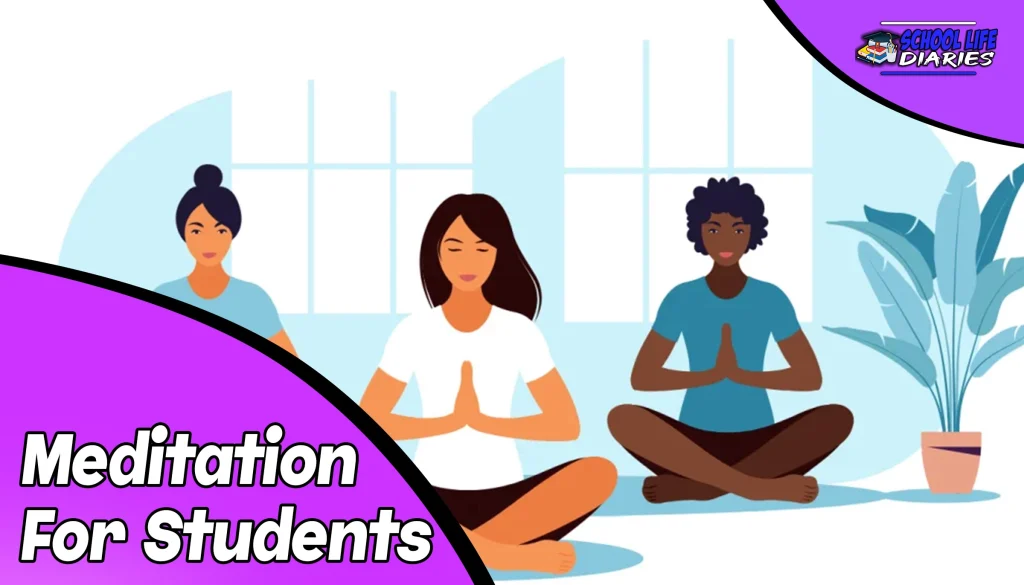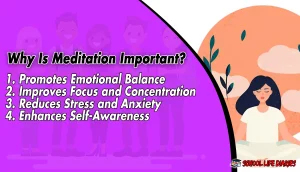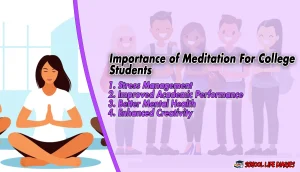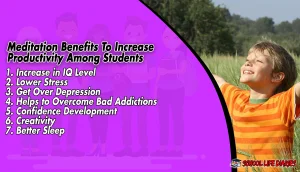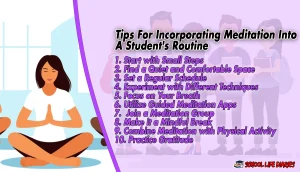As a student, you may often find yourself overwhelmed by the pressures of academic life. From exams to assignments and extracurricular activities, the constant demands can take a toll on your well-being. However, there is a powerful tool at your disposal that can help you find balance and inner peace amidst the chaos: meditation. Meditation for students has gained recognition as an effective practice for managing stress, improving focus, and promoting overall mental and emotional well-being.
By incorporating meditation into your daily routine, you can equip yourself with the necessary tools to navigate the challenges of student life with greater ease and clarity. In this article, we will explore the concept of meditation, its importance, and the numerous benefits it offers to students. So, let’s dive in!
What Is Meditation?
Meditation is a centuries-old practice that originated in ancient cultures and has been adopted by various religions and philosophies. It involves training the mind to achieve a heightened state of awareness and inner peace.
During meditation, individuals typically sit or lie down in a comfortable position and concentrate their attention on a specific object, thought, or breath. The goal is to quiet the mind, reduce distractions, and achieve a sense of tranquility and mental clarity.
Why Is Meditation Important?
Meditation is increasingly recognized as an essential practice for maintaining mental and emotional well-being. Its benefits extend beyond stress reduction and relaxation. Here are some key reasons why meditation is important:
1. Promotes Emotional Balance:
Regular meditation helps individuals develop emotional resilience and stability by regulating their emotions and enhancing self-awareness.
2. Improves Focus and Concentration:
By training the mind to stay present and focused, meditation improves concentration, attention span, and cognitive abilities.
3. Reduces Stress and Anxiety:
Meditation activates the body’s relaxation response, reducing the production of stress hormones and alleviating symptoms of anxiety.
4. Enhances Self-Awareness:
Through meditation, students can develop a deeper understanding of their thoughts, emotions, and behaviors, leading to personal growth and self-improvement.
Importance of Meditation For College Students
College life can be challenging, with academic pressures, social expectations, and the need to balance multiple responsibilities. Incorporating meditation into their routine can greatly benefit college students in various ways:
1. Stress Management:
students often experience high levels of stress due to exams, deadlines, and social pressures. Meditation provides a practical tool for managing stress and promoting a sense of calm and balance.
2. Improved Academic Performance:
Regular meditation enhances focus, memory, and cognitive abilities, leading to improved academic performance and retention of information.
3. Better Mental Health:
College students are susceptible to mental health issues such as anxiety and depression. Meditation acts as a preventive measure by reducing symptoms and promoting overall well-being.
4. Enhanced Creativity:
Meditation can stimulate creative thinking and problem-solving skills, allowing students to approach challenges from a fresh and innovative perspective.
Is Meditation Healthy For A Student?
Absolutely! Meditation is a safe and healthy practice for students when practiced correctly. It is a natural and drug-free way to promote mental, emotional, and physical well-being.
However, it is essential for students to approach meditation with the right mindset and seek guidance from experienced practitioners or instructors if needed.
Is Meditation Suitable For Students of All Ages?
Yes, meditation is suitable for students of all ages, from young children to older adults.
The techniques and duration of meditation may vary depending on the age group, but the fundamental principles remain the same.
Even younger students can benefit from simple mindfulness exercises and breathing techniques to improve focus and emotional regulation.
Meditation vs. Substance Abuse
Substance abuse is a prevalent issue among students, and it can have severe consequences on their academic performance and overall well-being.
Meditation provides an alternative and healthy way to cope with stress, anxiety, and peer pressure, reducing the likelihood of resorting to substance abuse.
By cultivating self-awareness and emotional resilience through meditation, students can make healthier choices and overcome the temptations associated with substance abuse.
Meditation Benefits To Increase Productivity Among Students
Meditation offers numerous benefits that directly contribute to increased productivity among students. Let’s explore some of the most impactful benefits:
1. Increase in IQ Level:
Research suggests that regular meditation practice can lead to an increase in IQ levels.
By improving focus, memory, and cognitive abilities, meditation enhances students’ capacity to grasp and retain information, ultimately boosting their intellectual performance.
2. Lower Stress:
Stress is a significant barrier to productivity and can hinder students’ ability to concentrate and perform at their best. Meditation acts as a powerful stress management tool, reducing the production of stress hormones and promoting a sense of calm and mental clarity.
3. Get Over Depression:
Depression is a common mental health issue that affects students’ motivation, energy levels, and overall well-being. Meditation, along with professional support, can help students overcome depression by promoting emotional balance, self-compassion, and resilience.
4. Helps to Overcome Bad Addictions:
Students struggling with addictive behaviors can find solace in meditation. By developing mindfulness and self-control, meditation helps break the cycle of addiction, empowering students to make healthier choices and overcome destructive habits.
5. Confidence Development:
Meditation fosters self-awareness, self-acceptance, and self-confidence. As students become more in tune with their thoughts and emotions through meditation, they develop a stronger sense of self and a belief in their abilities, leading to increased confidence in academic and personal pursuits.
6. Creativity:
Incorporating meditation into their routine can unlock students’ creative potential. By quieting the mind and allowing space for new ideas to emerge, meditation stimulates creativity and enhances problem-solving skills.
7. Better Sleep:
Quality sleep is crucial for students’ overall well-being and academic performance. Meditation promotes relaxation, reduces anxiety, and improves sleep quality, allowing students to wake up refreshed, energized, and ready to tackle their day.
Tips For Incorporating Meditation Into A Student’s Routine
Now that we understand the benefits of meditation for students, let’s explore some practical tips for incorporating meditation into their daily routines:
1. Start with Small Steps:
Begin with short meditation sessions of 5-10 minutes and gradually increase the duration as you become more comfortable. Consistency is key, so aim to meditate daily, even if it’s for a short time.
2. Find a Quiet and Comfortable Space:
Choose a quiet and peaceful environment where you can meditate without distractions. It could be your bedroom, a corner of a library, or a serene outdoor spot on campus.
3. Set a Regular Schedule:
Establish a specific time for your meditation practice each day. Whether it’s early morning, during a break between classes, or in the evening, having a consistent schedule will help you make meditation a habit.
4. Experiment with Different Techniques:
There are various meditation techniques to explore, such as mindfulness meditation, loving-kindness meditation, and guided meditation. Try different methods to find the one that resonates with you the most.
5. Focus on Your Breath:
One of the simplest and most effective meditation techniques is to focus on your breath. Pay attention to the sensation of each inhale and exhale, allowing your mind to become anchored in the present moment.
6. Utilize Guided Meditation Apps:
If you’re new to meditation, consider using guided meditation apps like Headspace, Calm, or Insight Timer. These apps provide guided sessions and can help you stay motivated and engaged in your practice.
7. Join a Meditation Group:
Look for meditation groups or clubs on campus or in your local community. Practicing meditation with others can provide support, accountability, and an opportunity to learn from experienced practitioners.
8. Make it a Mindful Break:
Incorporate short meditation breaks throughout your day. Instead of mindlessly scrolling through social media during a break, take a few minutes to sit quietly, breathe deeply, and reset your mind.
9. Combine Meditation with Physical Activity:
Consider incorporating mindfulness into your physical activities, such as mindful walking or yoga. Combining movement with meditation can be a powerful way to cultivate presence and relaxation.
10. Practice Gratitude:
Before or after your meditation session, take a moment to reflect on things you are grateful for. Cultivating a sense of gratitude can enhance your overall well-being and bring positivity into your life.
FAQs:
Q: How long should a student meditate each day?
A: The duration of meditation can vary based on personal preference and schedule. Starting with as little as 10 minutes a day and gradually increasing the duration can be beneficial for students. Consistency is more important than the length of each session.
Q: Can meditation replace therapy for students with mental health issues?
A: While meditation can complement therapy and provide valuable tools for managing mental health, it is not a substitute for professional help. Students with mental health issues should seek guidance from trained therapists or counselors in addition to practicing meditation.
Q: Can meditation help students with exam anxiety?
A: Yes, meditation can be highly effective in reducing exam anxiety. By calming the mind, students can approach exams with greater focus, clarity, and reduced fear of failure.
Q: Is it necessary to sit in a cross-legged position to meditate?
A: No, it is not necessary to sit in a cross-legged position to meditate. Students can find a comfortable position that allows them to relax and maintain good posture. Sitting in a chair, lying down, or using cushions for support are all acceptable options.
Q: How long does it take to experience the benefits of meditation?
A: The benefits of meditation can be experienced immediately, with even a short session promoting a sense of relaxation and calm. However, long-term and consistent practice yields more profound and lasting benefits.
Q: Can meditation help students with time management?
A: Yes, meditation can improve time management skills by enhancing focus, reducing distractions, and promoting a calm and organized mindset. Students who practice meditation are often better equipped to prioritize tasks and manage their time effectively.
Conclusion:
Meditation is a valuable practice that offers numerous benefits for students. From reducing stress and enhancing focus to promoting emotional well-being and creativity, meditation can be a powerful tool for success in academics and personal growth.
By incorporating meditation into their daily routine, students can navigate the challenges of college life with greater ease and achieve their full potential. So why not give it a try?
Start your meditation journey today and experience the transformative effects it can have on your life.
Meditation is a valuable practice that can greatly benefit students in their academic pursuits, mental health, and overall well-being.
By incorporating meditation into their routine and embracing the numerous benefits it offers, students can cultivate focus, reduce stress, enhance creativity, and develop emotional resilience.
So, whether you’re a high school student preparing for exams or a college student navigating the challenges of campus life, meditation can be a powerful tool to support your success and promote a balanced and fulfilling student experience.
Start your meditation journey today and discover the transformative effects it can have on your life, academic performance, and personal growth.

